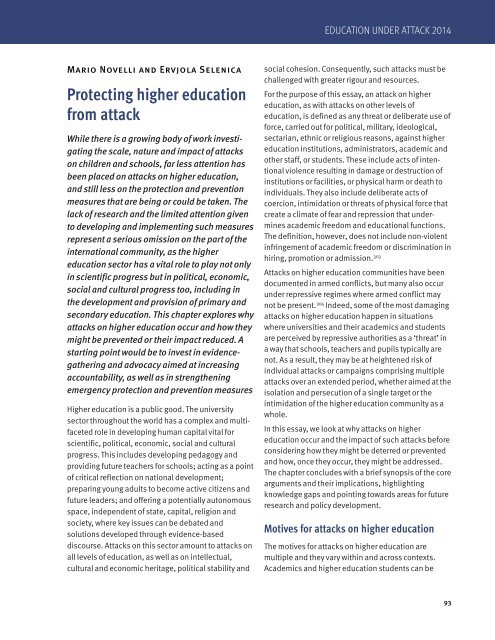Create successful ePaper yourself
Turn your PDF publications into a flip-book with our unique Google optimized e-Paper software.
EDUCATION UNDER ATTACK 2014<br />
Mario Novelli and Ervjola Selenica<br />
Protecting higher education<br />
from attack<br />
While there is a growing body of work investigating<br />
the scale, nature and impact of attacks<br />
on children and schools, far less attention has<br />
been placed on attacks on higher education,<br />
and still less on the protection and prevention<br />
measures that are being or could be taken. The<br />
lack of research and the limited attention given<br />
to developing and implementing such measures<br />
represent a serious omission on the part of the<br />
international community, as the higher<br />
education sector has a vital role to play not only<br />
in scientific progress but in political, economic,<br />
social and cultural progress too, including in<br />
the development and provision of primary and<br />
secondary education. This chapter explores why<br />
attacks on higher education occur and how they<br />
might be prevented or their impact reduced. A<br />
starting point would be to invest in evidencegathering<br />
and advocacy aimed at increasing<br />
accountability, as well as in strengthening<br />
emergency protection and prevention measures<br />
Higher education is a public good. The university<br />
sector throughout the world has a complex and multifaceted<br />
role in developing human capital vital for<br />
scientific, political, economic, social and cultural<br />
progress. This includes developing pedagogy and<br />
providing future teachers for schools; acting as a point<br />
of critical reflection on national development;<br />
preparing young adults to become active citizens and<br />
future leaders; and offering a potentially autonomous<br />
space, independent of state, capital, religion and<br />
society, where key issues can be debated and<br />
solutions developed through evidence-based<br />
discourse. Attacks on this sector amount to attacks on<br />
all levels of education, as well as on intellectual,<br />
cultural and economic heritage, political stability and<br />
social cohesion. Consequently, such attacks must be<br />
challenged with greater rigour and resources.<br />
For the purpose of this essay, an attack on higher<br />
education, as with attacks on other levels of<br />
education, is defined as any threat or deliberate use of<br />
force, carried out for political, military, ideological,<br />
sectarian, ethnic or religious reasons, against higher<br />
education institutions, administrators, academic and<br />
other staff, or students. These include acts of intentional<br />
violence resulting in damage or destruction of<br />
institutions or facilities, or physical harm or death to<br />
individuals. They also include deliberate acts of<br />
coercion, intimidation or threats of physical force that<br />
create a climate of fear and repression that undermines<br />
academic freedom and educational functions.<br />
The definition, however, does not include non-violent<br />
infringement of academic freedom or discrimination in<br />
hiring, promotion or admission. 303<br />
Attacks on higher education communities have been<br />
documented in armed conflicts, but many also occur<br />
under repressive regimes where armed conflict may<br />
not be present. 304 Indeed, some of the most damaging<br />
attacks on higher education happen in situations<br />
where universities and their academics and students<br />
are perceived by repressive authorities as a ‘threat’ in<br />
a way that schools, teachers and pupils typically are<br />
not. As a result, they may be at heightened risk of<br />
individual attacks or campaigns comprising multiple<br />
attacks over an extended period, whether aimed at the<br />
isolation and persecution of a single target or the<br />
intimidation of the higher education community as a<br />
whole.<br />
In this essay, we look at why attacks on higher<br />
education occur and the impact of such attacks before<br />
considering how they might be deterred or prevented<br />
and how, once they occur, they might be addressed.<br />
The chapter concludes with a brief synopsis of the core<br />
arguments and their implications, highlighting<br />
knowledge gaps and pointing towards areas for future<br />
research and policy development.<br />
Motives for attacks on higher education<br />
The motives for attacks on higher education are<br />
multiple and they vary within and across contexts.<br />
Academics and higher education students can be<br />
93


